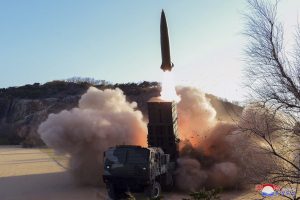North Korea’s state media reported on Sunday that the country had tested its “new-type tactical guided weapon,” the 12th missile test of this year. State media did not report any details of the performance of the missiles, but South Korea’s Joint Chiefs of Staff (JCS) confirmed on Sunday that the North launched two projectiles at 6:00 p.m. KST on Saturday, which flew about 110 kilometers at the altitude of 25 km. The JCS also said that the max speed of the missiles was less than Mach 4.0.
Despite the limited information on the performance and type of the North’s tested tactical guided weapons, the test-fired missiles outwardly appear to be smaller than the North’s KN-23 Iskander-class short-range ballistic missile (SRBM).
The missile test came a day after North Korea celebrated the 110th birth anniversary of Kim Il Sung, the founder of the country and late grandfather of the current leader Kim Jong Un, with a massive dance and fireworks display at Kim Il Sung Square.
South Korea’s JCS usually reports the North’s missile tests as soon as it detects them, but this time it reported the Saturday missile test after North Korean state media made the announcement. The Japanese Defense Ministry also typically gives an immediate press release on the North’s missile tests – sometimes even earlier than Seoul’s JCS – but Tokyo also did not catch the North’s missile test on Saturday.
South Korea’s belated response to the North’s missile test suggests that the current South Korea-U.S. combined missile defense system had not detected the North’s new-type tactical guided weapon. Critics have long said that missile defense systems will struggle to detect advanced missiles launched from the North if they fly to the South at low altitudes.
North Korea’s state media claimed that the missile test was successful and took place with Kim Jong Un in attendance.
“The new-type tactical guided weapon system developed under the special concern of the Party Central Committee is of great significance in radically increasing the fires striking power of the long-range artillery units on the front and strengthening the effectiveness of the tactical nuclear operation of the DPRK and diversification of the firepower task,” the state media reported. (DPRK is an acronym of North Korea’s formal name: the Democratic People’s Republic of Korea)
Based on the short distance and low altitude of the missiles’ test flight, the North’s “new-type tactical guided weapon” – which is likely to be a smaller type of the KN-23 SRBM – will be used to target South Korea when deployed. Developing a tactical guided weapon system is one of the key initiatives of the North’s five-year military modernization plan, introduced in the Party Congress last year. Saturday’s missile test indicated Pyongyang’s strong eagerness to develop a missile that the United States and South Korea cannot intercept in the air.
Kim Yo Jong, the powerful sister of Kim Jong Un and Pyongyang’s main voice on inter-Korean relations, previously published a statement denouncing South Korean Defense Minister Suh Wook’s remarks regarding the country’s pre-emptive strike capabilities against the North. In the wake of the election of Yoon Suk-yeol and the growing demands of South Koreans to develop the country’s own nuclear weapons to deter North Korea’s missile threats, Pyongyang will likely develop more advanced weapon systems in a bid to raise the ante in the nuclear talks and ensure its self-defense.
Sung Kim, the U.S. special representative for North Korea issues, visited Seoul on Monday and met his South Korean counterpart Noh Kyu-duk to discuss the flurry of missile tests from North Korea and escalating tensions on the Korean Peninsula. As the North will likely hold a military parade on April 25, the founding anniversary of the Korean People’s Revolutionary Army, Kim and Noh reaffirmed the two countries’ decisive and united voices on the North’s “escalatory actions.”
South Korea and the U.S. also began their joint military exercises on Monday. The scale of the drills will likely increase as both Seoul and Washington feel the necessity of reinvigorating the scaled-backed joint military drills that had been carried out under limited conditions for the past few years. North Korea perceives the joint drills as preparation for an invasion, part of the “hostile policy” of the US and South Korea against the country. In response, Pyongyang is likely to show off its advanced missile technology at the parade on April 25.

































